Switzerland and Europe
Keynotes from Alexander Van der Bellen and Ignazio Cassis
Federal Councilor Ignazio Cassis highlighted the challenges ahead for Switzerland, describing the current geopolitical landscape as one marked by extraordinary uncertainty and significant complexity. As both Cassis and Austrian President Alexander Van der Bellen emphasized, decisions made today will shape the country’s future role in Europe.
In the first half of the year, the UBS Center focused on the topic of Switzerland and the European Union, addressing key challenges and future decisions for Switzerland’s role in Europe. At the Wirtschaftspodium Schweiz, Cassis stressed the increasing global uncertainty and the need for Switzerland to carefully navigate its position between sovereignty and deeper integration into the European framework. He highlighted the importance of adapting to changing circumstances in order to face geopolitical shifts.
Van der Bellen, speaking just a few weeks earlier at a UBS Center Opinion, made a similar point: the European Union is a “perpetual construction site” – essential, but in need of reform. He remarked, “If the EU didn’t exist, we would have to invent it. But it must be restructured.” The EU’s political structure is flawed, but its cohesion remains crucial for Europe’s stability.
While both politicians agree on the necessity of bold action, their views diverge on the best path forward. Van der Bellen advocates for a more integrated Europe to address crises such as climate change and geopolitical tensions. For him, member states must prioritize unity over national interests. Yet, he acknowledges the difficulty in achieving consensus within the EU, especially in foreign and defense policy.
The “Wirtschaftspodium Schweiz” featured two panel discussions, one focusing on Switzerland’s relationship with the EU and the other on the economic implications of immigration.
The first panel discussion raised key issues, including Switzerland’s relationship with the EU and the economic effects of immigration. The debate about closer ties with the EU featured opposing views: Esther Friedli (State Councilor, SVP) opposed further integration, arguing that Switzerland’s “DNA” doesn’t align with the EU’s, while Eva Herzog (State Councilor, SP) highlighted the benefits of bilateral agreements. Michael Hengartner (President of the ETH Board) emphasized the importance of stable relations, especially in science.
The second panel addressed the economic implications of immigration, a topic that sparked differing opinions. Some argued that immigration strengthens the workforce, while others pointed to the social costs. Prof. Reiner Eichenberger (University of Fribourg) noted that while the benefits are often privatized, society bears the broader costs. Prof. Alexandra Spitz-Oener (Humboldt University Berlin) emphasized that “immigration is essential for maintaining prosperity.”
Keynotes from Alexander Van der Bellen and Ignazio Cassis
Federal Councilor Ignazio Cassis highlighted the challenges ahead for Switzerland, describing the current geopolitical landscape as one marked by extraordinary uncertainty and significant complexity. As both Cassis and Austrian President Alexander Van der Bellen emphasized, decisions made today will shape the country’s future role in Europe.
In the first half of the year, the UBS Center focused on the topic of Switzerland and the European Union, addressing key challenges and future decisions for Switzerland’s role in Europe. At the Wirtschaftspodium Schweiz, Cassis stressed the increasing global uncertainty and the need for Switzerland to carefully navigate its position between sovereignty and deeper integration into the European framework. He highlighted the importance of adapting to changing circumstances in order to face geopolitical shifts.
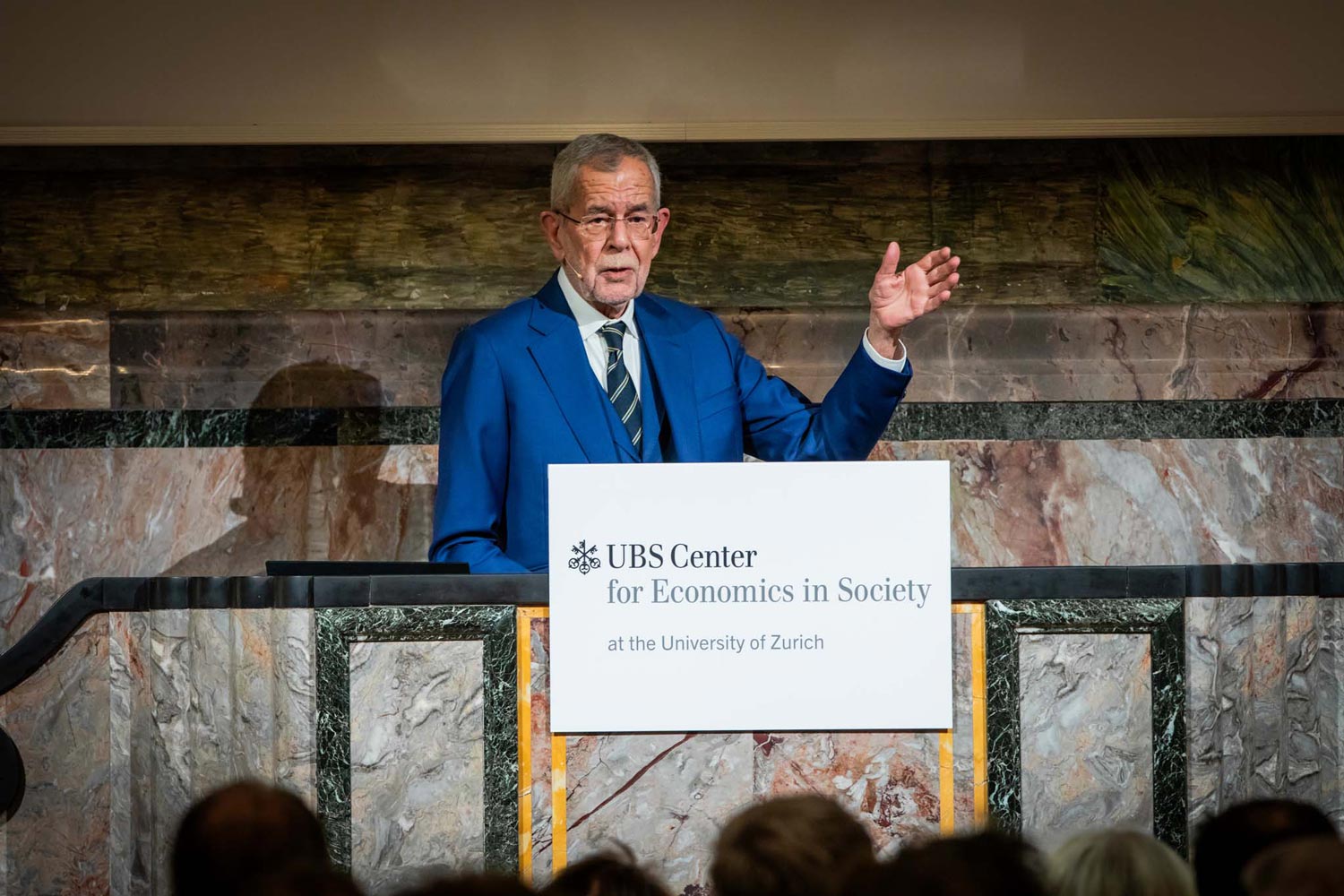
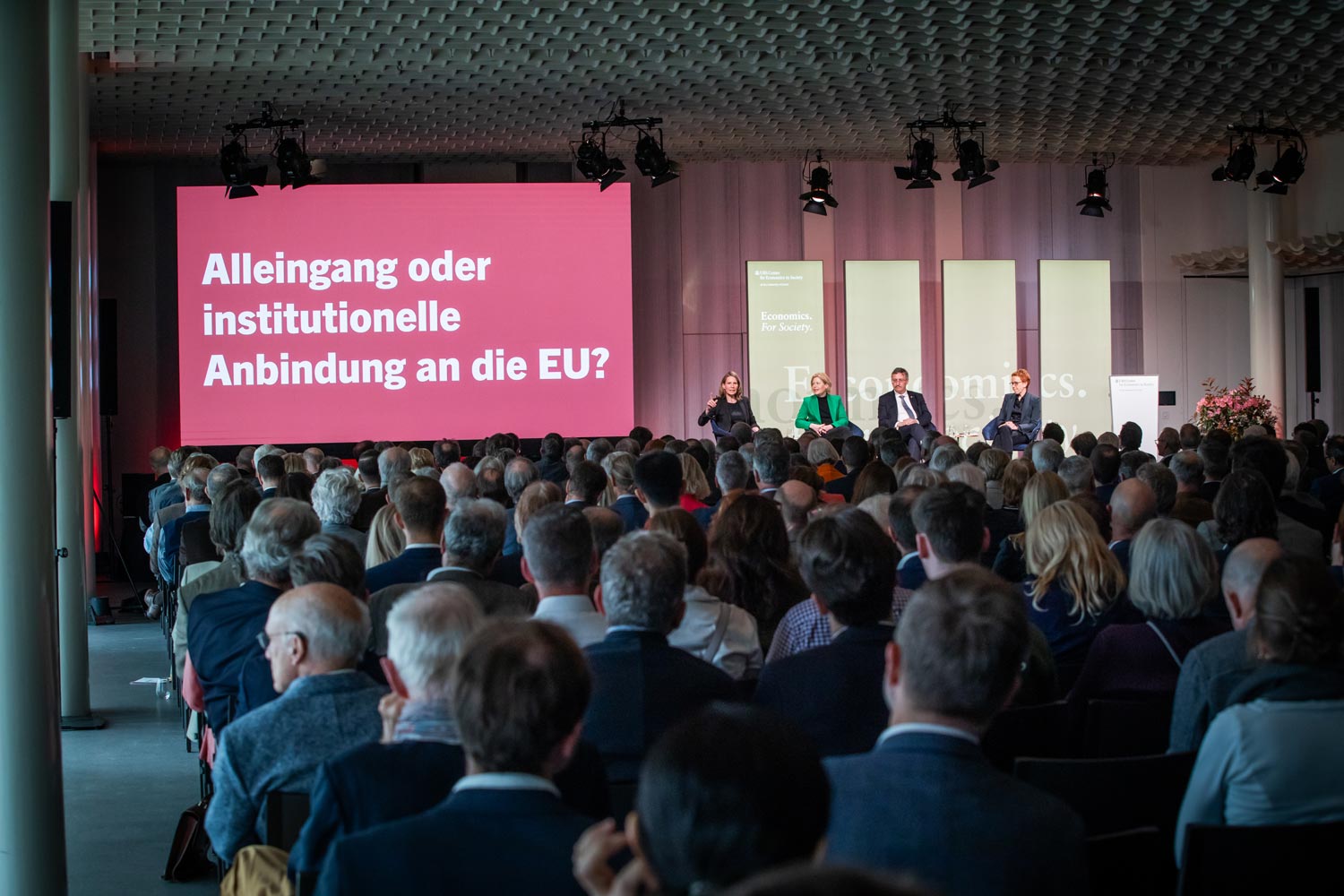
AI unleashed
Economic realities beyond the hype
The dynamic and multifaceted topic of AI and Big Data was a focal point in 2024, with an emphasis on their economic potential and societal impact. Experts discussed both the promises and challenges of these transformative technologies.
Our annual Forum for Economic Dialogue focused on the economic realities beyond the AI hype, featuring thought leader Sendhil Mullainathan, who highlighted that AI is like a “bicycle for the mind” that extends human capabilities, creating new opportunities for less-qualified workers. He urged to “look beyond the hype and focus on innovation.” Mullainathan emphasized that AI can help improve decision-making, increase business efficiency, and promote social mobility. Prof. Gregory Crawford (Zalando and University of Zurich) echoed these points, stating that AI could help reduce inequality by enhancing decision-making processes within companies.
David Dorn addressed AI’s impact on the labor market, suggesting that AI could help counter inequalities created by previous automation. He pointed out that AI could open new opportunities in fields such as healthcare and law. Christine Antlanger-Winter (Google Switzerland) also sees great potential in the application of AI, while urging swift action. She warned that while generative AI could add significant value to Switzerland’s GDP, delayed adoption could limit these gains.
AI and Big Data were also discussed in our webcast series, one of them analyzing AI’s role in the Global South, featuring development economist Prof. David Yanagizawa-Drott who presented an optimistic view of how AI could improve productivity and wages in emerging markets.
In conclusion, the presentations and discussions underscored AI and Big Data’s transformative potential and the need to manage them thoughtfully for equitable outcomes.
Economic realities beyond the hype
The dynamic and multifaceted topic of AI and Big Data was a focal point in 2024, with an emphasis on their economic potential and societal impact. Experts discussed both the promises and challenges of these transformative technologies.
Our annual Forum for Economic Dialogue focused on the economic realities beyond the AI hype, featuring thought leader Sendhil Mullainathan, who highlighted that AI is like a �“bicycle for the mind” that extends human capabilities, creating new opportunities for less-qualified workers. He urged to “look beyond the hype and focus on innovation.” Mullainathan emphasized that AI can help improve decision-making, increase business efficiency, and promote social mobility. Prof. Gregory Crawford (Zalando and University of Zurich) echoed these points, stating that AI could help reduce inequality by enhancing decision-making processes within companies.
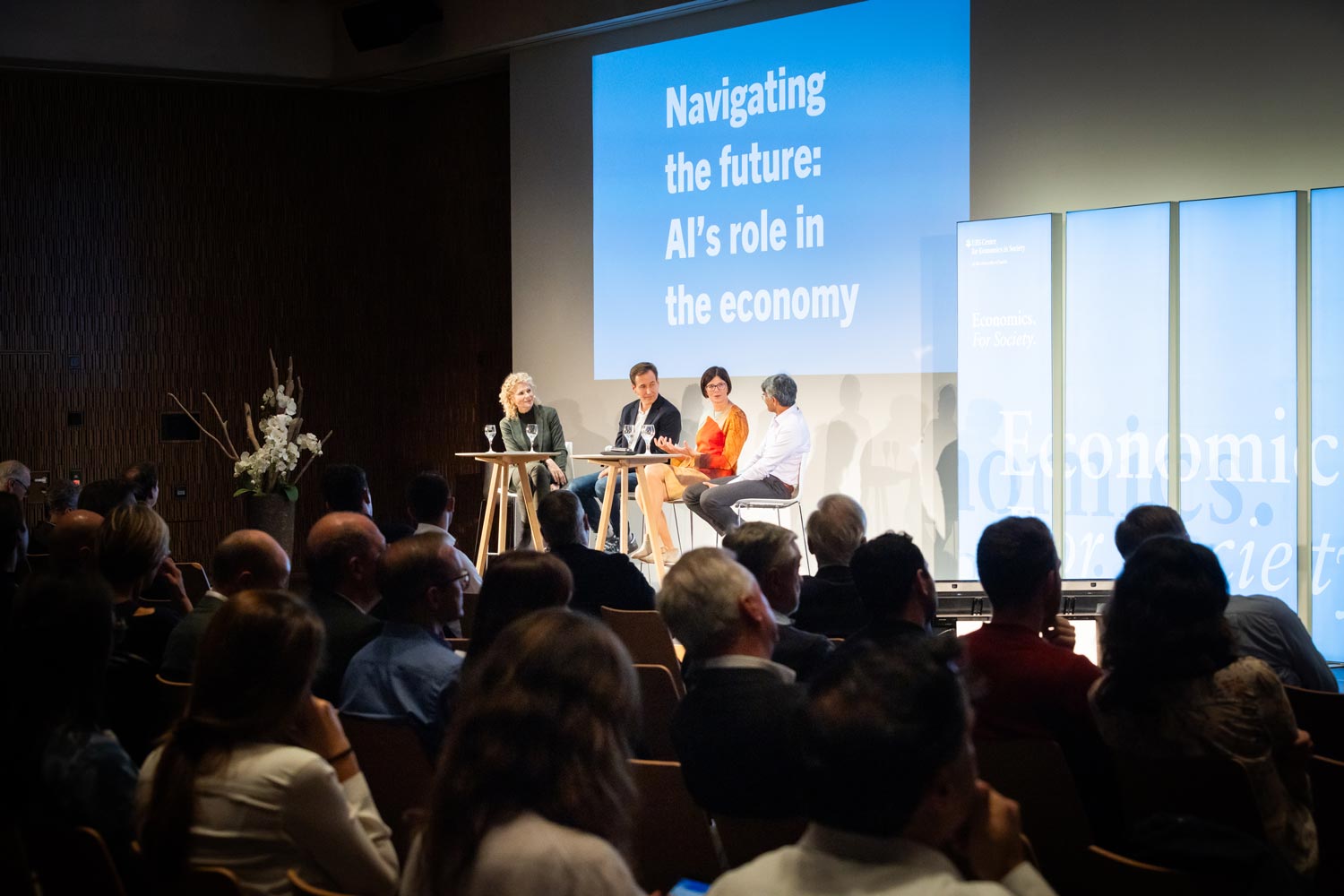
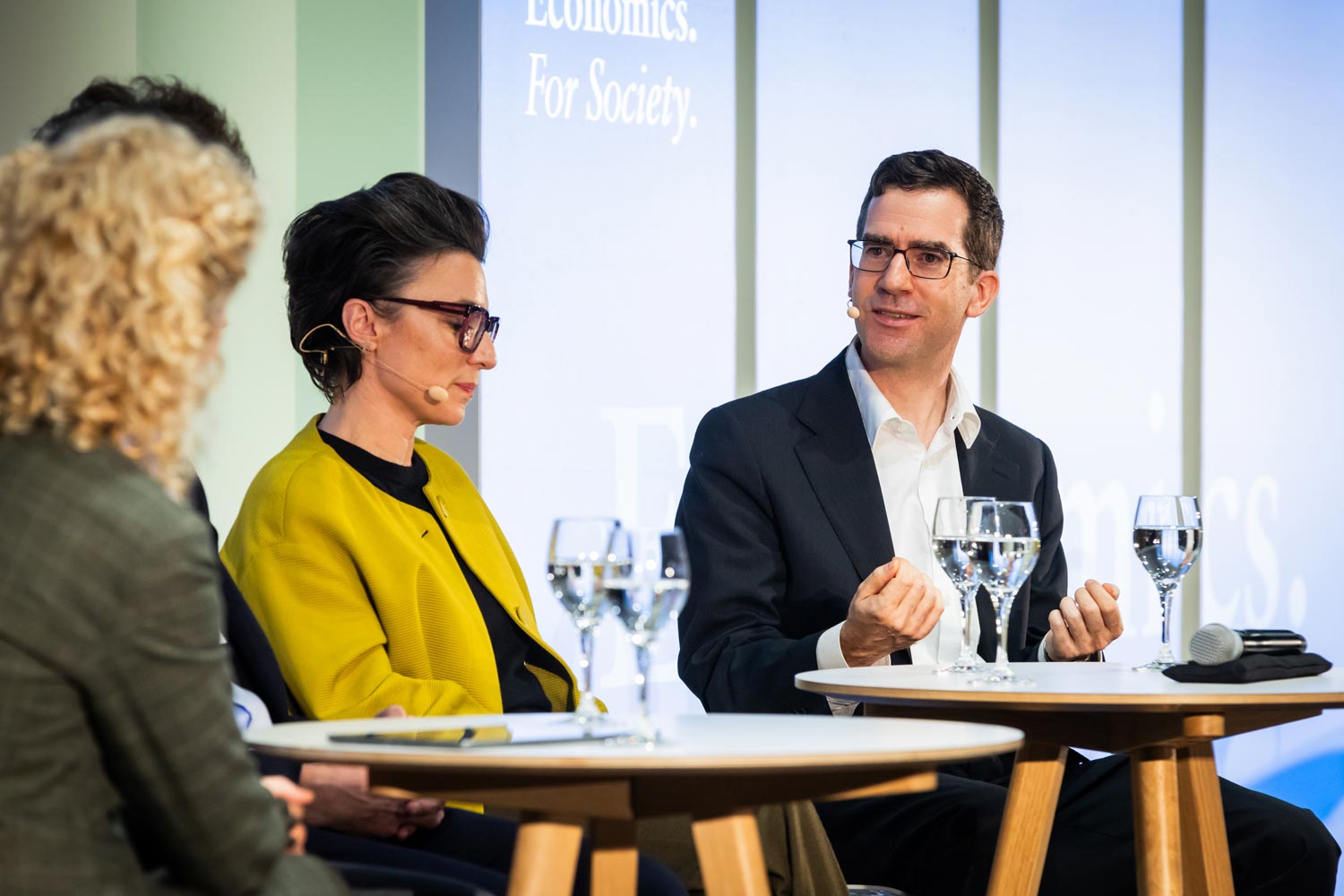
Unlocking the culture code
The value of corporate culture
At the UBS Center’s joint event with Università della Svizzera italiana, Prof. Luigi Guiso highlighted the evolving role of corporate culture in business and economics. He explained that while economic models historically neglected cultural factors, corporate values – integral to culture – have significant impacts on performance. Guiso’s research shows that while proclaimed values may not directly affect performance, managerial integrity strongly correlates with success. Companies that align leadership actions with stated values see higher stock returns, greater growth opportunities, and better resilience during crises.
The panel discussion brought together Luigi Guiso, Sergio P. Ermotti (UBS), and Ernst Fehr (University of Zurich), with USI Rector Luisa Lambertini as moderator. The dialogue explored how leadership, norms, and values intersect to shape corporate culture, particularly in times of organizational integration, and evolving work environments. The panelists concluded that corporate culture is a living, dynamic construct shaped by leadership, values, and societal influences. Effective leaders must navigate these complexities with authenticity, adaptability, and a commitment to fostering environments that empower individuals while aligning them with organizational goals.
The value of corporate culture
At the UBS Center’s joint event with Università della Svizzera italiana, Prof. Luigi Guiso highlighted the evolving role of corporate culture in business and economics. He explained that while economic models historically neglected cultural factors, corporate values – integral to culture – have significant impacts on performance. Guiso’s research shows that while proclaimed values may not directly affect performance, managerial integrity strongly correlates with success. Companies that align leadership actions with stated values see higher stock returns, greater growth opportunities, and better resilience during crises.
The panel discussion brought together Luigi Guiso, Sergio P. Ermotti (UBS), and Ernst Fehr (University of Zurich), with USI Rector Luisa Lambertini as moderator. The dialogue explored how leadership, norms, and values intersect to shape corporate culture, particularly in times of organizational integration, and evolving work environments. The panelists concluded that corporate culture is a living, dynamic construct shaped by leadership, values, and societal influences. Effective leaders must navigate these complexities with authenticity, adaptability, and a commitment to fostering environments that empower individuals while aligning them with organizational goals.
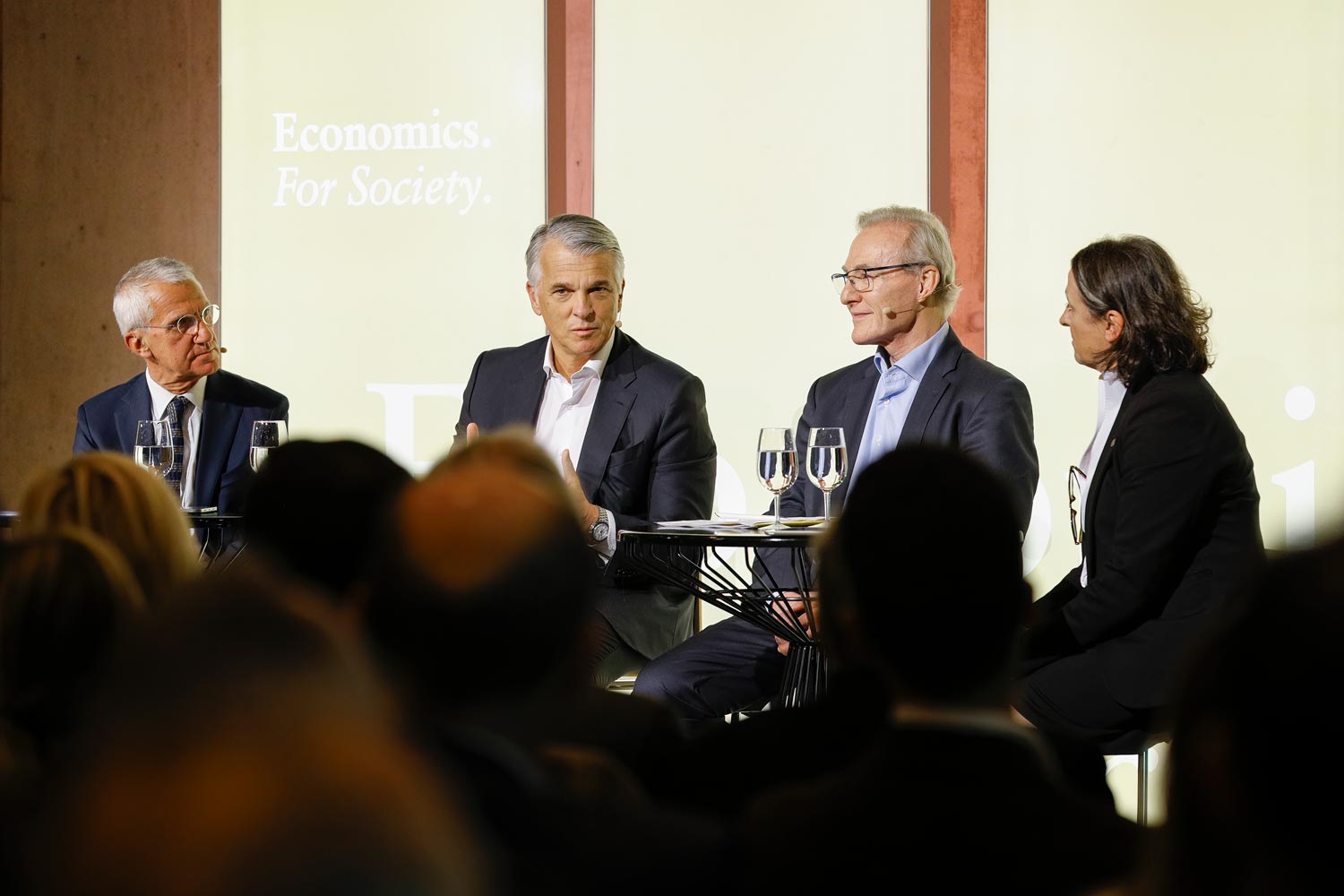
Land markets in sub-Saharan Africa
Key to development
How do land tenure reforms impact agricultural productivity in sub-Saharan Africa? “Land is the most important physical asset for the poor in Africa. It holds the potential to drive economic growth if managed effectively,” development economist Lorenzo Casaburi explained in our webcast, emphasizing the importance of secure land rights.
Prof. Casaburi presented data from his research on formal land markets in Uganda and Kenya, showing how the formalization of land rights can increase productivity by improving access to formal markets and making land use more efficient (see Fig. 1). Casaburi demonstrated how these changes lead to higher harvest values and better land utilization. The webcast highlighted how land rental markets can increase agricultural productivity by expanding access to formal markets thereby counteracting the widening gap between Africa and other regions of the world.
Key to development
How do land tenure reforms impact agricultural productivity in sub-Saharan Africa? “Land is the most important physical asset for the poor in Africa. It holds the potential to drive economic growth if managed effectively,” development economist Lorenzo Casaburi explained in our webcast, emphasizing the importance of secure land rights.
Prof. Casaburi presented data from his research on formal land markets in Uganda and Kenya, showing how the formalization of land rights can increase productivity by improving access to formal markets and making land use more efficient (see Fig. 1). Casaburi demonstrated how these changes lead to higher harvest values and better land utilization. The webcast highlighted how land rental markets can increase agricultural productivity by expanding access to formal markets thereby counteracting the widening gap between Africa and other regions of the world.
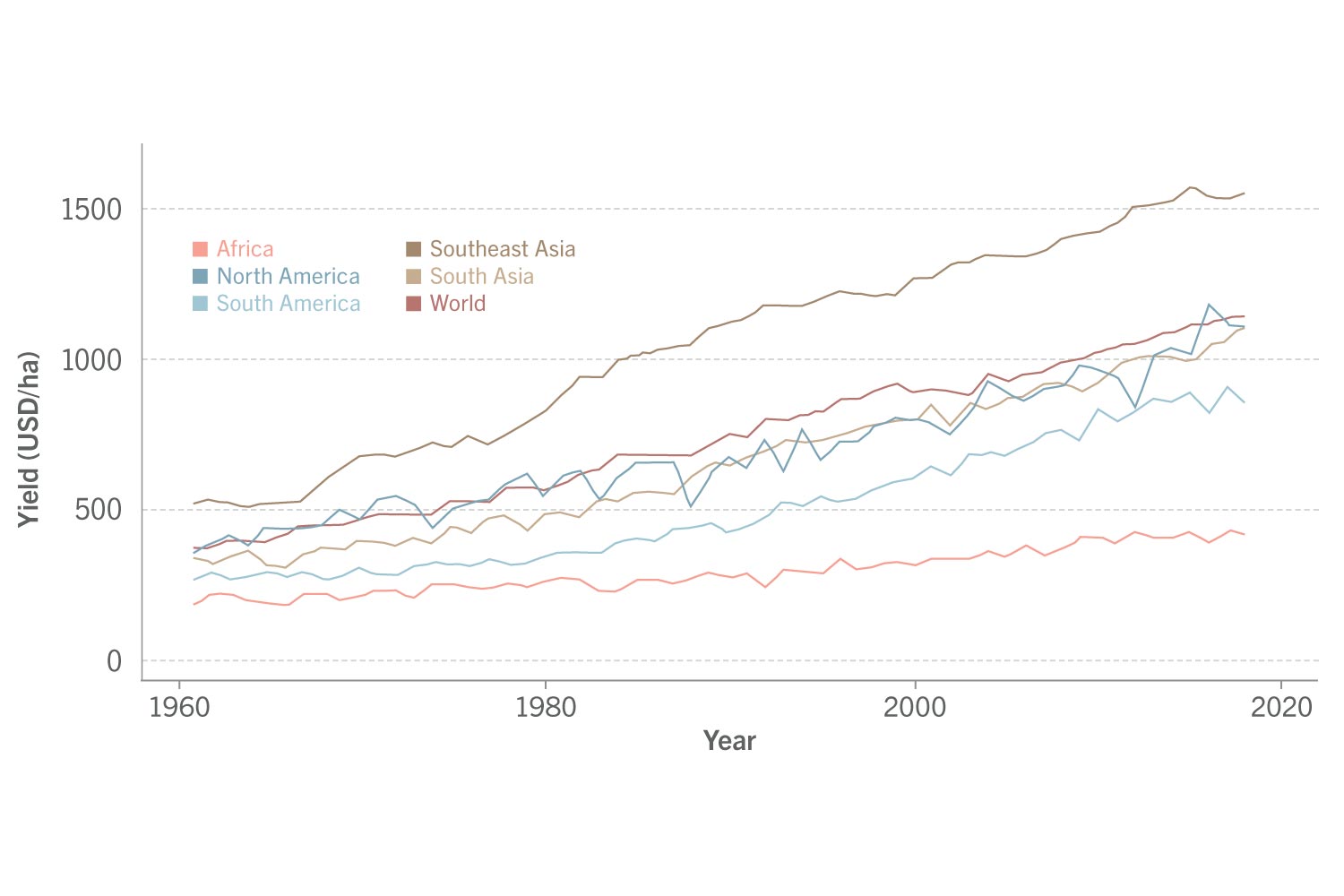
Origins of economic prosperity
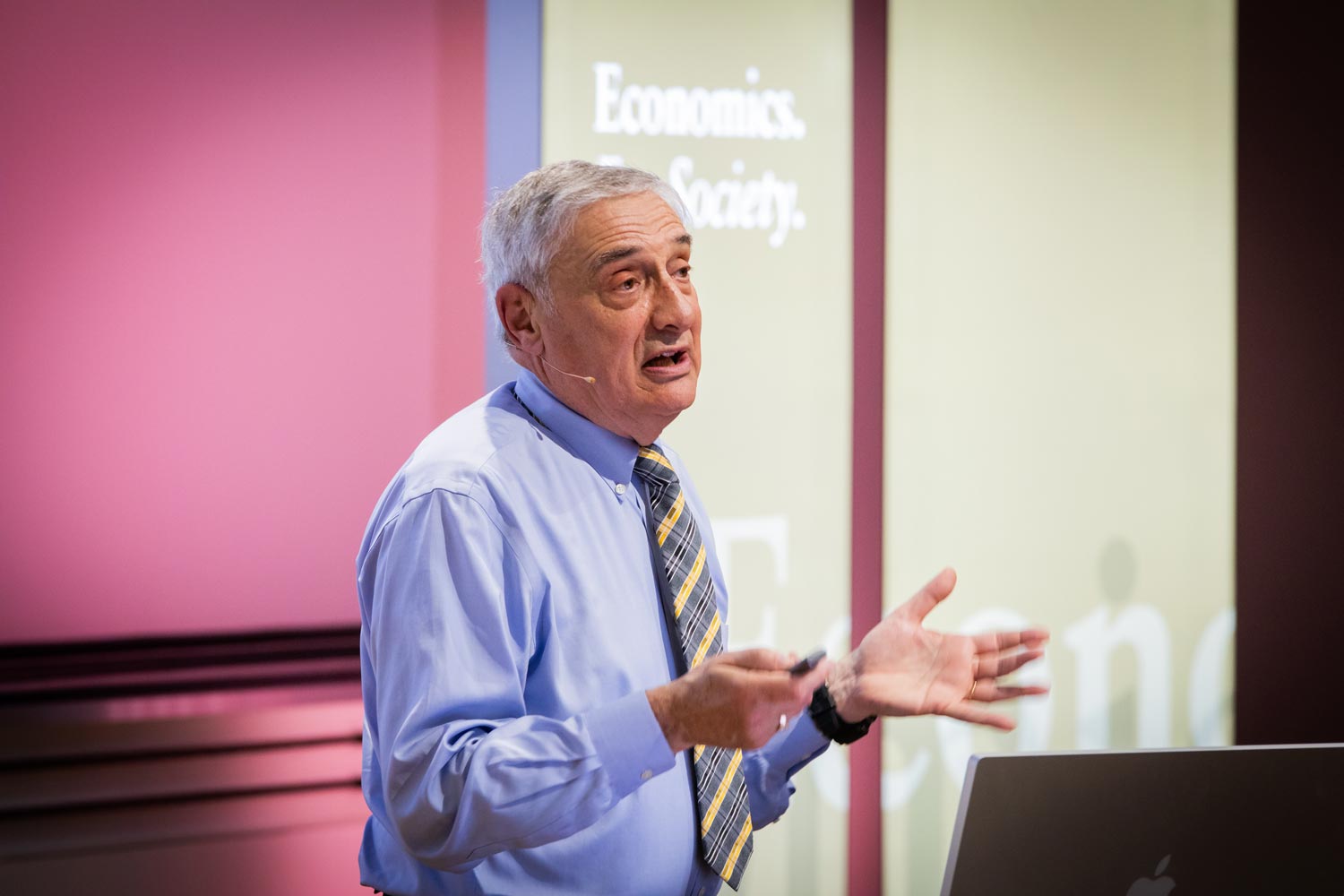
Leadership transition on Foundation Council
Christian Mumenthaler succeeds Kaspar Villiger
Kaspar Villiger stepped down as Chairman of the Foundation Council at the end of 2024. Christian Mumenthaler, former Group CEO of Swiss Re, assumed the role as his successor effective 1 January 2025, bringing his vision and expertise to guide the UBS Center’s continued effort in building bridges between academia and the broader society.
In 2012, Kaspar Villiger, then Chairman of UBS, initiated the foundation of the UBS Center, made possible by UBS’s 100 million Swiss franc donation on its 150th anniversary. Villiger, along with UBS Group CEO Sergio P. Ermotti and Professor Ernst Fehr, established a foundation that bridges academia, business, and policy to address critical economic and social issues. “Kaspar Villiger has been a remarkable leader, whose vision and dedication have been foundational in bringing together academia, business, and policy at the UBS Center. His legacy will inspire us for years to come,” states Professor Ernst Fehr, Vice Chairman of the Foundation Council. Today, thanks to Villiger’s vision, the UBS Center has helped the Department of Economics at the University of Zurich to become an international hub for top economic research and societal dialogue in Switzerland and beyond.
Christian Mumenthaler, an industry leader with extensive experience at Swiss Re, brings a unique perspective to the UBS Center’s mission. His commitment to fostering dialogue and promoting a forward-thinking approach in the industry aligns seamlessly with the Center’s goals. “In fostering open dialogue between science and society, the UBS Center plays a pivotal role. I am excited to join this mission and help advance our shared goals for economic understanding and progress,” Mumenthaler states.
Christian Mumenthaler succeeds Kaspar Villiger
Kaspar Villiger stepped down as Chairman of the Foundation Council at the end of 2024. Christian Mumenthaler, former Group CEO of Swiss Re, assumed the role as his successor effective 1 January 2025, bringing his vision and expertise to guide the UBS Center’s continued effort in building bridges between academia and the broader society.
In 2012, Kaspar Villiger, then Chairman of UBS, initiated the foundation of the UBS Center, made possible by UBS’s 100 million Swiss franc donation on its 150th anniversary. Villiger, along with UBS Group CEO Sergio P. Ermotti and Professor Ernst Fehr, established a foundation that bridges academia, business, and policy to address critical economic and social issues. “Kaspar Villiger has been a remarkable leader, whose vision and dedication have been foundational in bringing together academia, business, and policy at the UBS Center. His legacy will inspire us for years to come,” states Professor Ernst Fehr, Vice Chairman of the Foundation Council. Today, thanks to Villiger’s vision, the UBS Center has helped the Department of Economics at the University of Zurich to become an international hub for top economic research and societal dialogue in Switzerland and beyond.
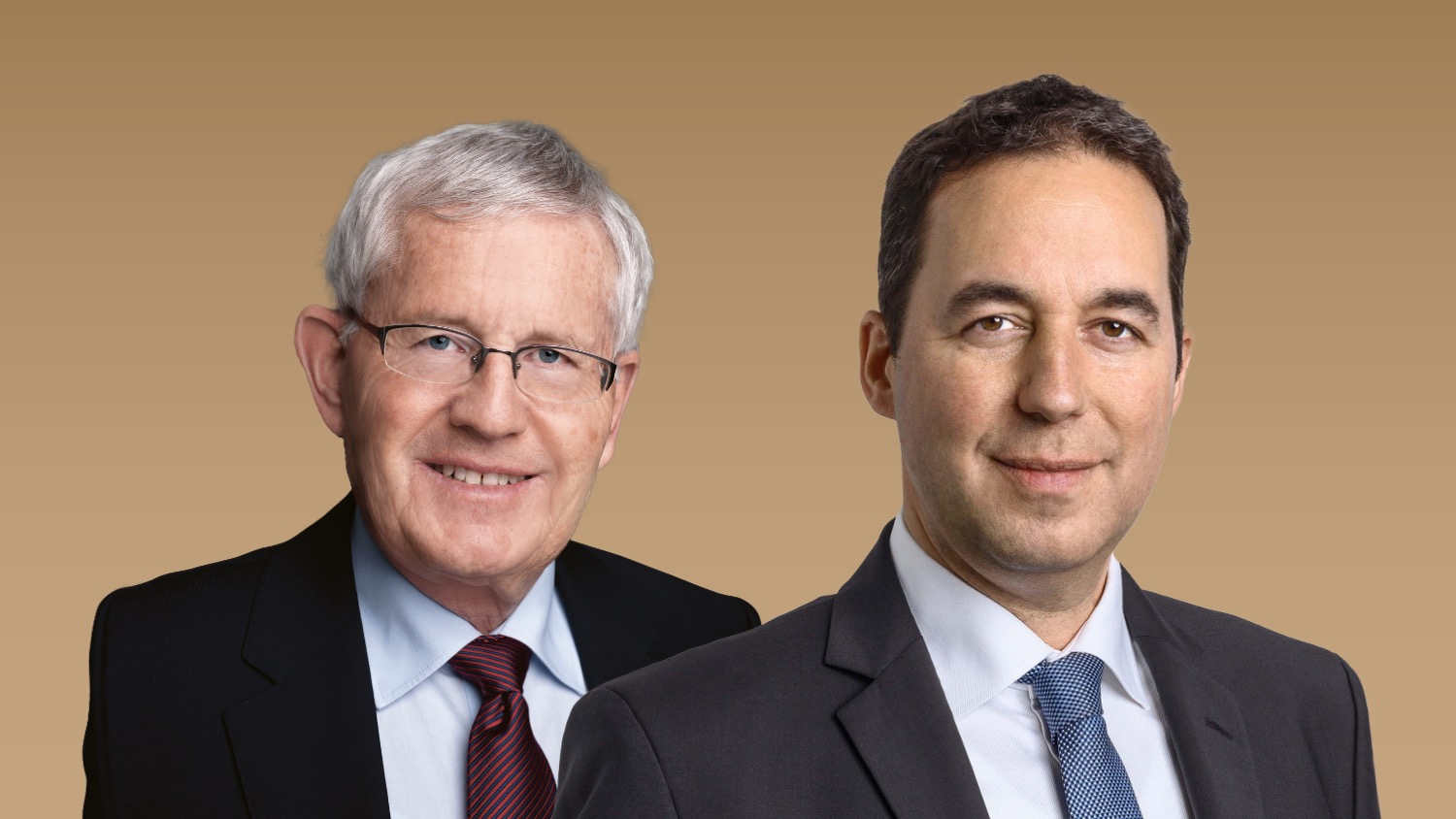
Center news
Welcome, Maya Eden and Andreas I. Mueller
Maya Eden and Andreas I. Mueller joined the Department of Economics at the University of Zurich in 2024 and have been affiliated with the UBS Center. Their shared field of research is macroeconomics, with Prof. Eden focusing on welfare economics and Prof. Mueller concentrating on labor and monetary economics.
New affiliations
We are excited to announce our newest affiliations and warmly welcome two long-standing professors from the Department of Economics to the UBS Center: Prof. Lorenzo Casaburi is renowned for his research in the field of development economics, emphasizing applied research to improve living conditions in emerging economies. Prof. Roberto Weber’s research falls primarily within the areas of behavioral and experimental economics, decision-making, and the study of organizations and institutions.
Congratulations, Claudia Gentile
UBS Center Scholarship recipient Claudia Gentile has successfully defended her PhD thesis titled “Essays on clean growth, the renewable energy transition, and financial shocks in the intangible economy” at the Zurich Graduate School of Economics. Her research explores the impact of policies on clean energy adoption, innovation, and welfare. She will soon join the London School of Economics as a Postdoctoral Researcher before beginning her tenure as an Assistant Professor at the University of Geneva’s Institute of Economics and Econometrics (IEE).
Welcome, Maya Eden and Andreas I. Mueller
Maya Eden and Andreas I. Mueller joined the Department of Economics at the University of Zurich in 2024 and have been affiliated with the UBS Center. Their shared field of research is macroeconomics, with Prof. Eden focusing on welfare economics and Prof. Mueller concentrating on labor and monetary economics.
New affiliations
We are excited to announce our newest affiliations and warmly welcome two long-standing professors from the Department of Economics to the UBS Center: Prof. Lorenzo Casaburi is renowned for his research in the field of development economics, emphasizing applied research to improve living conditions in emerging economies. Prof. Roberto Weber’s research falls primarily within the areas of behavioral and experimental economics, decision-making, and the study of organizations and institutions.
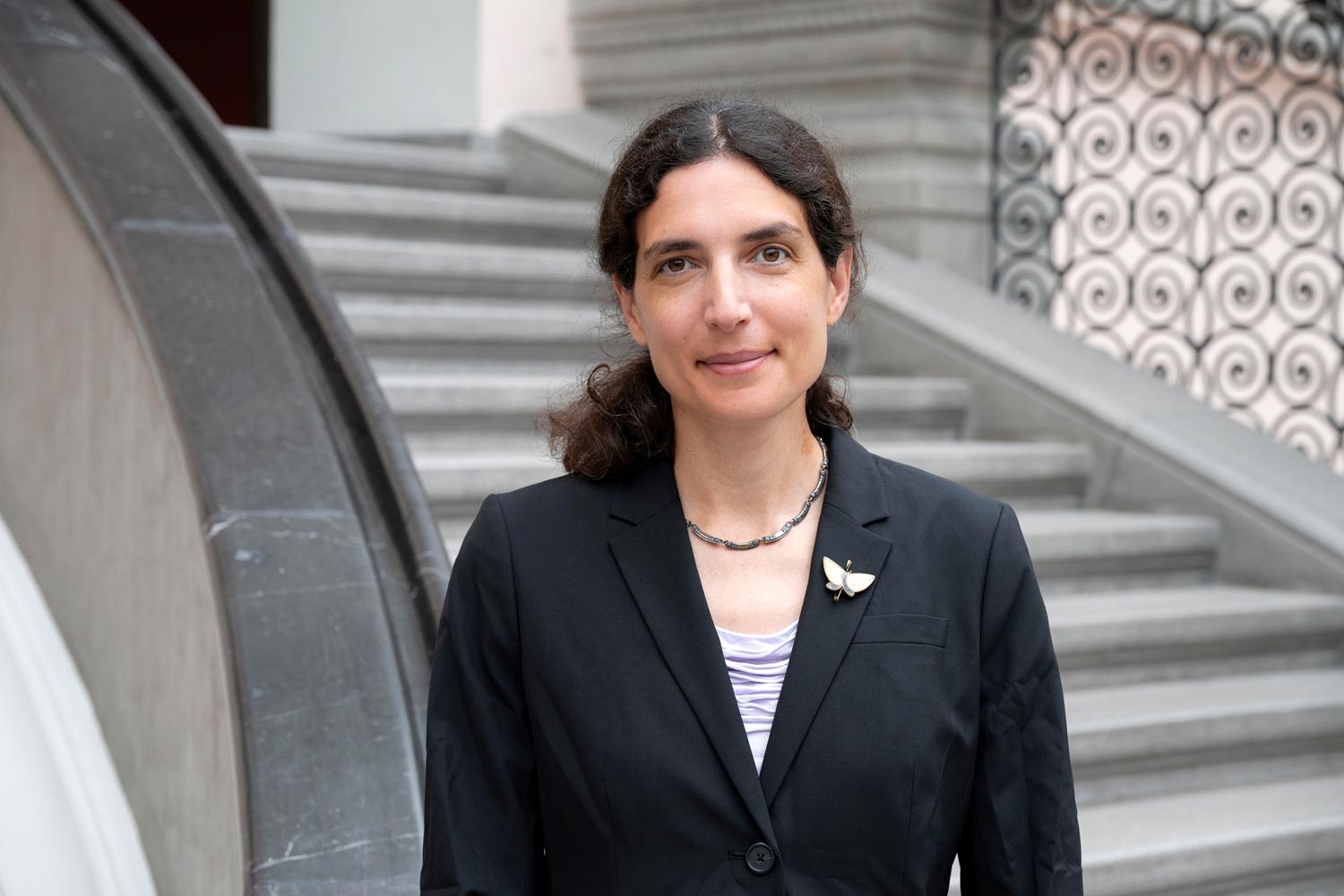
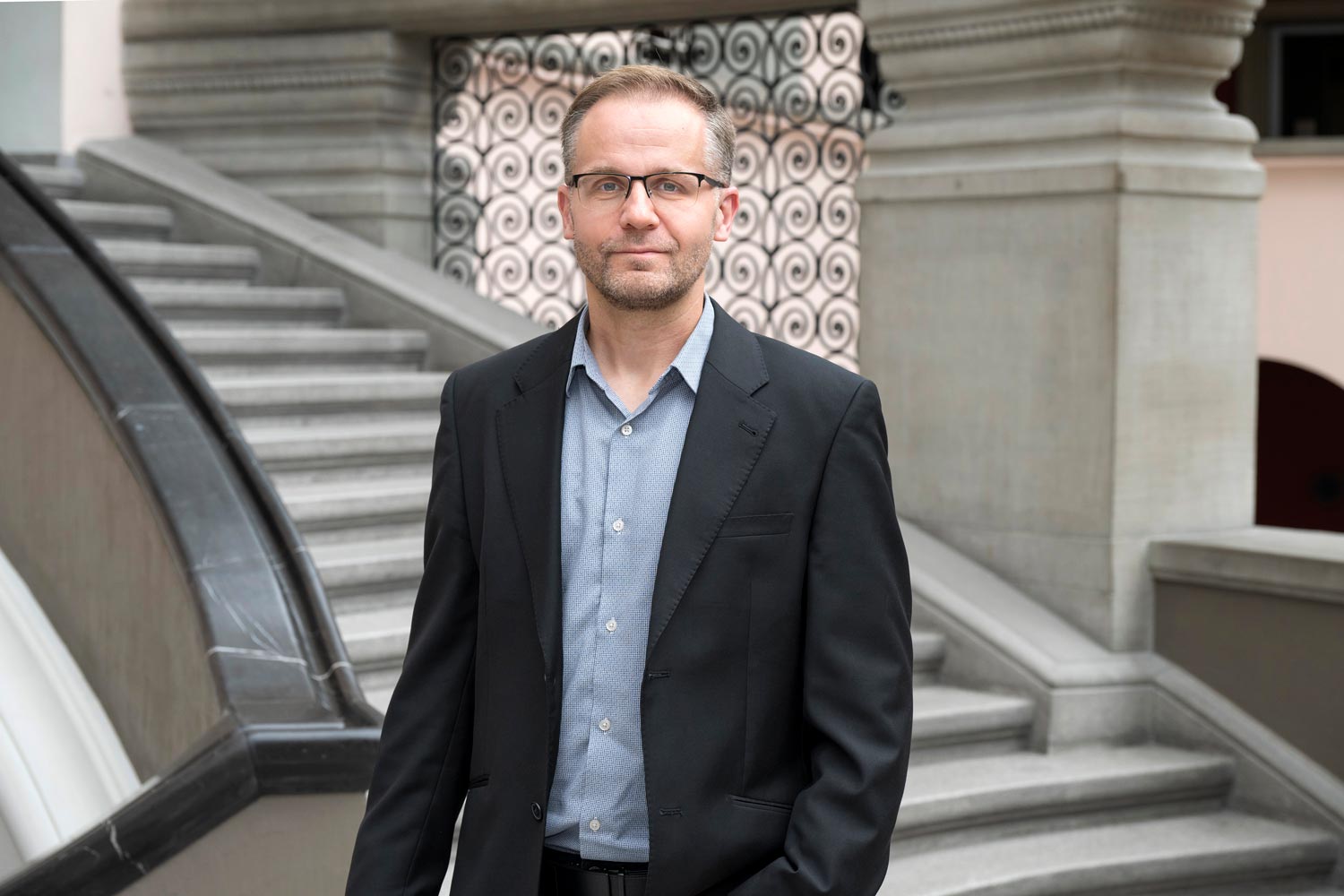
In memory of Kahneman
